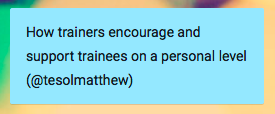
It wasn’t the first time I’d suggested an ELT twitter chat topic and had it taken up only to miss the chat itself…in fact, now that I think about it this also isn’t the first time I’ve written the summary for such a chat. While I did join in during the slow burn bit, I suppose summarizing is one way to belatedly take part further (so I will go ahead add a few of my own comments as I read and summarize the chat here).
July’s #CELTAchat topic was:

Sandy Millin started off the chat proper by asking what “on a personal level” might mean exactly, and for Darren Bell the answer was supporting weaker trainees or those with special needs. Fiona Price suggested something of the inverse, ensuring stronger trainees are sufficiently challenged. Enter Giovani Licata, inviting the chat to consider both, under the umbrella of “personalization on the CELTA”.
If talking about personal needs, Sandy offered, it’s important to have a clear interview process and identify where they might need extra help. e.g. SEN. She shared that she once had an ADHD candidate who didn’t declare it until Stage 2 tutorials and it made so much sense! But surely if that were known earlier, the candidate could have been “encouraged and supported” more proactively and perhaps avoided some extra challenge. Regarding SEN, Giovanni added that the course application form needs to explicitly ask for that info. I know that at the last place I did CELTA work for the application had a write-in space where applicants added info about “any special needs” or something to that effect. Perhaps a more direct question would yield more useful info, but I think there also may be some legal limit on what we might appear to be requesting or specific ways we should be working it (this was in the US)? To be honest I’m really not sure. Fiona mentioned how important it is to disclose info in the application, letting it be known that it is so we can provide support.
The chat inspired Cathy to reflect on her application as well: it asks for a declaration of health or any other issues that may affect performance, but no one ever declares a SEN on. She wondered if they might try asking in another way. Also, when she asked about this at a conference session, she was told that candidates with SENs could be given longer to complete coursework. This could be quite tricky, however, in practice.
Adi Rajan found that many trainees don’t disclose special needs during the interview but subsequently feel that their needs are not being addressed. He had a trainee who raised this with the assessor. Speaking more of SEN, Darren shared a link to Giovanni’s appearance on the ‘Study CELTA Podcast’, talking about the topic of supporting candidates with dyslexia! It’s here. Finally, Darren shared a link to a rather thorough and fascinating report on working with CELTA candidates who are visually or hearing impaired.

Next, Giovanni said that one thing that helps keep things more “personalized” from the start is not deciding ahead of time who is teaching what. This is something we often do on CELTAs – assigning early TP lessons to incoming candidates before the course has even started and we’ve met them. Cathy Bowden described what I think it likely typical and based entirely on the normal constraints: candidates are divided into groups based on application and interview info, there’s time to meet them in person first, and they get those first TP points on day one. Sure, we consider information from their applications and interviews in this whole process as much as possible (I know me and my co-trainers tend to have a bit of fun together chatting about our perceptions of and predictions about our incoming candidates based on their apps and interviews), but it’s still a far cry from holding off until we’ve met face-to-face and making more decisions then. (I’ve tended to practice the former, but in a flexible way so I can toggle early TP lesson assignments around if its for the best; at this stage in the course the trainees rarely have any notion of how things are supposed to work anyway…then again, it’s also nice just to have everything sorted logistically SO THAT you can pay more attention to all the fresh new faces on the scene, in a way). Fiona called this flexibility important in terms of designing the course around the individual needs of the trainees so it’s more organic.
Sandy asked if other chatters might even do this for later TPs, too. And if I were in the live chat I’d have posted a GIF of some goofy character rigorously nodding ‘YESSSS!’. I think that in large part what we should aim for is “setting trainees up for success” in the TP experience, so if I think person X would do great teaching lesson Y, I’ll go right ahead and put X and Y together.
Cathy brought up Stage 1 tutorials as a good tool for giving early reassurance that candidates are doing okay (or not) and find out if they’re having trouble that might not yet be apparent from a distance. Giovanni tends to give written feedback for Stage 1s, but not face-to-face tutorials. This was/is true for me as well, but reflecting on it now I’m not sure why a little extra time to chat with each candidate at that early stage wouldn’t be a good thing. Oh yeah! It’s probably because while that’s true enough…there are a million other things to do on any given day even early on in the course so written feedback there does seem to check that box in a practical way. Perhaps I should start adding a little note at the bottom of it, though? Something like: if there’s anything here you would like to talk about, or especially anything that’s troubling you now that might be a bigger challenge as the course progresses, please let me know!
Shifting gears a little bit, Darren asked: what about creating a welcoming culture? There was Toronto CELTA tutor Patrick Huang‘s recent (IATEFL?) talk on promoting inclusivity on a CELTA course – in this case for a transgender candidate. Sandy attended and said it was a very good talk (I’ve seen Patrick speak at TESOL and also recommend his presentations!). Particularly thought-provoking, Sandy observed, were ideas about not forcing people to disclose, but setting up a comfortable environment where they can if they want to (Patrick’s talk summarized by her here).

Fiona then asked: “what about support beyond the course or trainee support?” and answered her own question by sharing that she has used Edmodo on a couple of courses, and trainees often create WhatsApp groups to support each other (another chatter mentioned Schoolology). When I worked at a CELTA center in Boston, MA we had a type of in-house LMS that included chat boards for candidates. It was clunkier than, say, FB messenger…but its being there at least introduced the idea that candidates are well served by linking up online. These communication channels can be particularly important because, as Cathy mentioned, there isn’t much slack to give time when a trainee could talk to a trainer (and the same is often true in regards to trainees talking to trainees). Everyone is constantly busy and don’t always want to make day longer. Fiona added that it’s good if there is someone else they can go to outside the course – if possible.

After the hour-long live chat ended, I came around and added some thoughts about what the topic meant to me:
- Not thinking of tutorials as the *only* time for personalized check-in (eg talk re: opinion of course, well-being, support needed? etc.). As much as possible, “sprinkling this around” during the course of each day.
- Using humor to, well, humanize yourself and the course atmosphere. Because CELTA + humorless trainers = a potentially horrid experience)
- Going out for a nip w/ interested trainees after the course and sending them off with a big final dose of personal connection (via shared anecdotes, etc. I often learn a lot of useful info about how trainees connected and support each other during the course in these sessions!).
- Adding bits of personal perspective in the initial interview (eg ‘I remember on my CELTA when..’), and elsewhere. I think trainees who do interviews are on a spectrum here and occasionally I’ve noticed how ‘impersonal’ this initial contact is and wondered what kind of effect that might have.
- Simply smiling and signaling positive support…even in those stresspool moments in the course, not letting negativity that might come up in the group dynamics, etc. reflect in your baring as a matter of course.
That topic suggestion, I said, came out of the experience of working with a number of different trainers (a privilege and a silver lining of one of my CELTA employer’s modus operandi) and finding that some tutors clearly foregrounded the personal while others did this far less. And to be clear, trainers toward both extremes worked with high degrees of skillfulness and efficacy to be sure – there’s not one ‘right’ way IMO (more ‘personal’ does not = better!). I’ve worked with trainees who be very unlikely to describe their approach as focused on any particular “personal touch”…yet are among the best and most well-loved trainers. I’m sure Adi would agree with that, but he also flagged some CELTA trainers as “less than humourless, guarding against cynicism and [having] that “this is where my job” ends attitude”.
Clearly candidates on a course like the CELTA require a good deal of support of various types, including the “personal”, and successful course trainers are aware of this need. However, I don’t think we can deny that CELTA has, for better or for worse, something of a reputation for it’s intensiveness (yay) PLUS a rather “harsh” and “impersonal” culture (not yay), and course trainers who fit Adi’s description aren’t helping matters in this area. So, if and how CELTA MCTs and ACTs provide various kinds of “personal” connection and support, and/or facilitate and encourage trainees to get and give support to each other, etc. seems like a crucial, perennial issue.
Adi seemed to agree, saying that this was his interpretation of the topic as well: creating a tutor-trainee relationship that’s not defined solely by the dispensing of knowledge, feedback and grades!
That seems like a very nice note to end on.
***
One more link shared in chat: https://www.teachingenglish.org.uk/article/coaching-emotional-intelligence-webinar-nik-peachey

Thanks for reading! Comments welcome here, or of course tweet with the hashtag. 🙂
